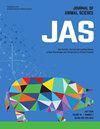短期补饲变化下奶牛历史表现对精准饲喂的生产反应
IF 2.9
2区 农林科学
Q1 AGRICULTURE, DAIRY & ANIMAL SCIENCE
引用次数: 0
摘要
在奶牛养殖中,精确饲养是一种很有前途的方法,通过根据奶牛的个体需求定制饲料来提高效率。在这项研究中,我们评估了奶牛个体在短期内对不同膳食补充剂的反应,并测试了两种精确喂养方法,这些方法使用奶牛过去的表现来预测最佳的膳食补充剂选择。24头泌乳奶牛分别给予不同的高蛋白或高能量补充剂,或不给予补充剂,以确定其对采食量和产奶量的影响。然后,使用两种精确喂养策略来分配补充剂:一种基于每头奶牛过去的平均反应,另一种基于它们表现随时间的变化。在训练阶段,接受能量和/或蛋白质补充的奶牛比对照组的奶牛吃得更多,产奶量也更多,但它们将饲料转化为牛奶的效率较低。在算法测试阶段,测试的两种算法均未观察到DMI、MY或FE的改善。重要的是,与传统饮食的奶牛相比,精确喂养的奶牛并没有获得更多的收入或降低饲料成本。这些发现表明,基于过去短期表现的简单精确进料可能不是提高生产率或利润的可靠方法。可能需要更先进的工具来充分实现个性化喂养在乳制品生产中的潜力。本文章由计算机程序翻译,如有差异,请以英文原文为准。
Production responses of dairy cows to precision feeding based on historical performance during short-term changes in supplementation
Lay Summary Precision feeding in dairy farming is a promising approach to improve efficiency by tailoring cow diets to individual needs. In this study, we evaluated how individual dairy cows respond to different dietary supplements over short periods and tested two precision feeding methods that used cows' past performance to predict the best supplement choice. Twenty-four lactating cows were given different high-protein or energy-rich supplements, or no supplement, to determine the effect on their feed intake and milk production. Then, two precision feeding strategies were used to assign supplements: one based on the average past response of each cow, and the other based on changes in their performance over time. During the training phase, cows that received energy and/or protein supplements ate more and produced more milk than cows on the control diet, but they were less efficient in converting feed into milk. During the algorithm testing phase, no improvements in DMI, MY, or FE were observed for either of the two algorithms tested. Importantly, the precision-fed cows did not earn more revenue or reduce feed costs compared to those on a conventional diet. These findings suggest that simple precision feeding, based on short-term past performance, may not be a reliable method for improving productivity or profit. More advanced tools may be needed to realize the potential of individualized feeding in dairy production fully.
求助全文
通过发布文献求助,成功后即可免费获取论文全文。
去求助
来源期刊

Journal of animal science
农林科学-奶制品与动物科学
CiteScore
4.80
自引率
12.10%
发文量
1589
审稿时长
3 months
期刊介绍:
The Journal of Animal Science (JAS) is the premier journal for animal science and serves as the leading source of new knowledge and perspective in this area. JAS publishes more than 500 fully reviewed research articles, invited reviews, technical notes, and letters to the editor each year.
Articles published in JAS encompass a broad range of research topics in animal production and fundamental aspects of genetics, nutrition, physiology, and preparation and utilization of animal products. Articles typically report research with beef cattle, companion animals, goats, horses, pigs, and sheep; however, studies involving other farm animals, aquatic and wildlife species, and laboratory animal species that address fundamental questions related to livestock and companion animal biology will be considered for publication.
 求助内容:
求助内容: 应助结果提醒方式:
应助结果提醒方式:


